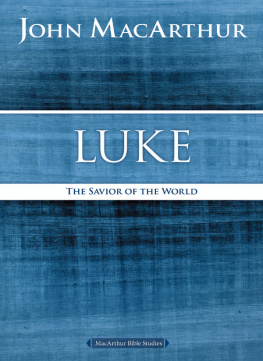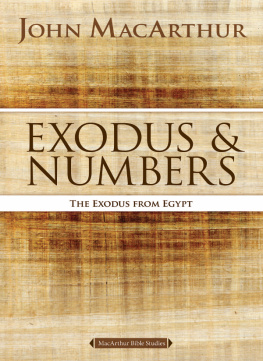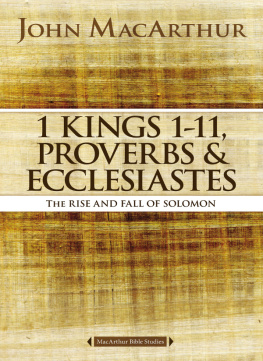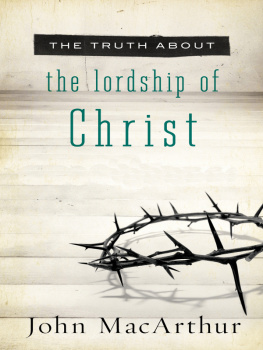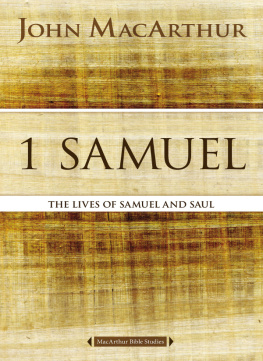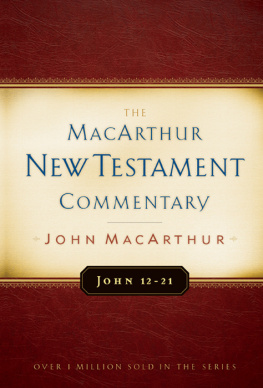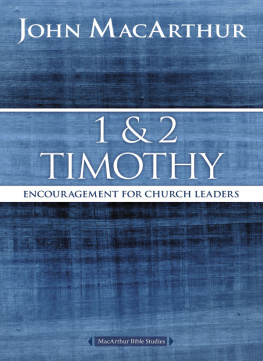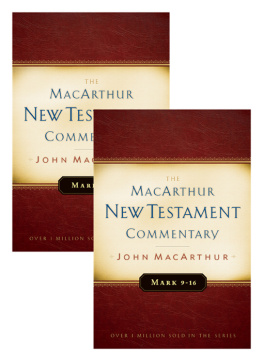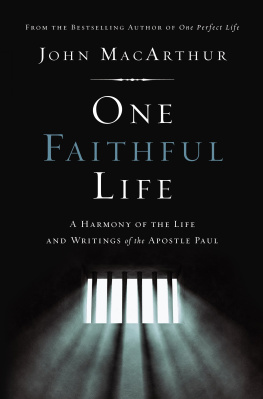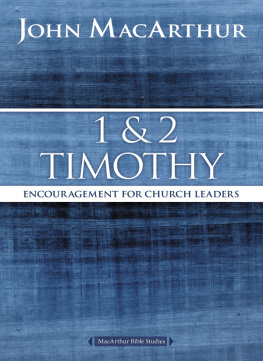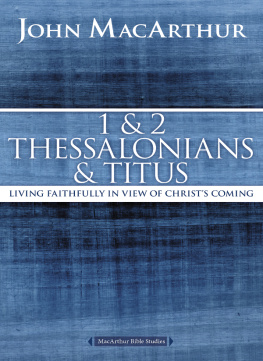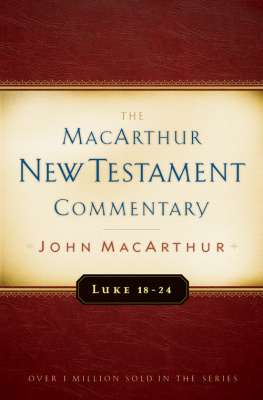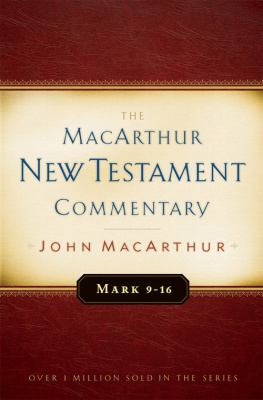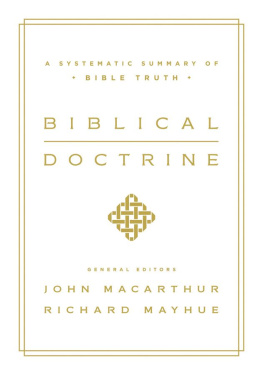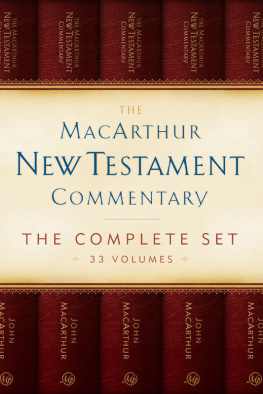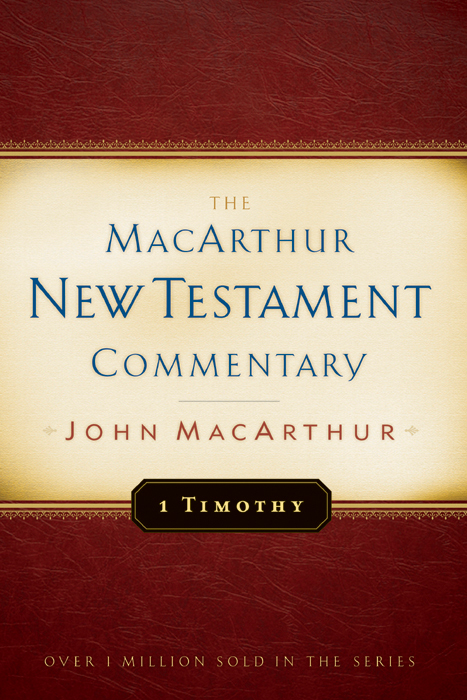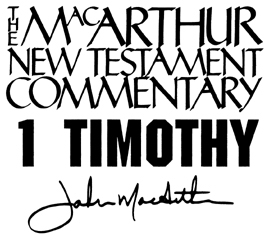
M OODY P UBLISHERS /C HICAGO
1995by
J OHN M AC A RTHUR
All rights reserved. No part of this book may be reproduced in any form without permission in writing from the publisher, except in the case of brief quotations embodied in critical articles or reviews.
All Scripture quotations, unless otherwise indicated, are taken from the New American Standard Bible, Copyright The Lockman Foundation 1960, 1962, 1963, 1968, 1971, 1972, 1973, 1975, 1977. Used by permission.
Scripture quotations marked KJV are taken from the King James Version.
ISBN: 0-8024-0756-0
ISBN-13:978-0-8024-0756-6
We hope you enjoy this book from Moody Publishers. Our goal is to provide high-quality, thought-provoking books and products that connect truth to your real needs and challenges. For more information on other books and products written and produced from a biblical perspective, go to www.moodypublishers.com or write to:
Moody Publishers
820 N. LaSalle Boulevard
Chicago, IL 60610
11 13 15 17 19 20 18 16 14 12
Printed in the United States of America
To Jim Rickard, my loyal friend,
who always finds a way to invade
the routines of life with adventure.
Thanks for including me.
Titles in the MacArthur New Testament Commentary Series
Matthew 1-7
Matthew 8-15
Matthew 16-23
Matthew 24-28
John 1-11
John 12-21
Acts 1-12
Acts 13-28
Romans 1-8
Romans 9-16
First Corinthians
Second Corinthians
Galatians Ephesians
Philippians
Colossians and Philemon
First and Second Thessalonians
First Timothy
Second Timothy
Titus Hebrews
James
First Peter
Second Peter & Jude
First-Third John
Revelation 1-11
Revelation 12-22

Contents
Preface
It continues to be a rewarding divine communion for me to preach expositionally through the New Testament. My goal is always to have deep fellowship with the Lord in the understanding of His Word and out of that experience to explain to His people what a passage means. In the words of Nehemiah 8:8,1 strive to give the sense of it so they may truly hear God speak and, in so doing, may respond to Him.
Obviously, Gods people need to understand Him, which demands knowing His Word of truth (2 Tim. 2:15) and allowing that Word to dwell in us richly (Col. 3:16). The dominant thrust of my ministry, therefore, is to help make Gods living Word alive to His people. It is a refreshing adventure.
This New Testament commentary series reflects this objective of explaining and applying Scripture. Some commentaries are primarily linguistic, others are mostly theological, and some are mainly homiletical. This one is basically explanatory, or expository. It is not linguistically technical, but deals with linguistics when this seems helpful to proper interpretation. It is not theologically expansive, but focuses on the major doctrines in each text and on how they relate to the whole of Scripture. It is not primarily homiletical, though each unit of thought is generally treated as one chapter, with a clear outline and logical flow of thought. Most truths are illustrated and applied with other Scripture. After establishing the context of a passage, I have tried to follow closely the writers development and reasoning.
My prayer is that each reader will fully understand what the Holy Spirit is saying through this part of His Word, so that His revelation may lodge in the minds of believers and bring greater obedience and faithfulnessto the glory of our great God.
Introduction to the Pastoral Epistles
First Timothy, along with 2 Timothy and Titus, belongs to the group of Pauls writings known as the Pastoral Epistles. They are so named because they were addressed to two of Pauls dear sons in the faith, Timothy and Titus, who had pastoral duties. Timothy was in charge of the church at Ephesus, and Titus of those on the island of Crete. Along with Philemon, they are the only letters of Paul addressed to an individual.
The Pastoral Epistles yield valuable insights into the heart of the beloved apostle. They show a different side of him than do his other epistles, revealing his personal relationships with his intimate friends and associates. As the last of his letters to be written, they alone inform us of the later years of his ministry, following his release from his first Roman imprisonment recorded in Acts. They carry his life through to its triumphant conclusion, which he declares in 2 Timothy 4:7: I have fought the good fight, I have finished the course, I have kept the faith.
The Pastoral Epistles are also important because of the wealth of information they contain concerning practical matters of church life and organization. In fact, Paul states that his purpose in writing 1 Timothy was that Timothy may know how one ought to conduct himself in the household of God, which is the church of the living God, the pillar and support of the truth (1 Tim. 3:15). Public worship, the selection and qualifications of church leaders, the pastors personal life and public ministry, how to confront sin in the church, the role of women, the care of widows, and how to handle money are among the matters discussed. Besides the wealth of practical information they contain, the Pastoral Epistles, as will be discussed below, also teach important doctrinal truths about the Scriptures, salvation, and the Savior.
A UTHORSHIP
Until the rise of destructive higher criticism in the nineteenth century, the Pauline authorship of the Pastoral Epistles was not questioned in the church (except by obvious heretics such as Marcion). In fact, the testimony from the early church that Paul wrote the Pastoral Epistles is as strong as that for any of his inspired writings, except for Romans and 1 Corinthians. There are references to them in the writings of several second-century church fathers, including Ignatius, Polycarp, and Clement of Rome. The Muratorian Canon, a list of canonical books from the late second century, includes them. In the third century, such writers as Origen, Clement of Alexandria, and Tertullian quote passages from these epistles and attribute them to Paul. Finally, the church historian Eusebius, writing early in the fourth century, includes the Pastoral Epistles with the genuine Pauline Epistles. (For a detailed listing of the historical evidence for the Pastoral Epistles genuineness, see William Hendricksen, New Testament Commentary: Exposition of the Pastoral Epistles[Grand Rapids: Baker, 1981], 29-33; Homer A. Kent, Jr., The Pastoral Epistles, rev. ed. [Winona Lake, Ind.: BMH, 1982], 24-33.)
In spite of the clear testimony of the epistles themselves (cf. 1 Tim. 1:1; 2 Tim. 1:1; Titus 1:1) and the evidence from the early church, many modern critical scholars deny that Paul wrote the Pastoral Epistles. Instead, they propose that a devoted follower of Paul composed them in the second century, possibly using some genuine fragments of Pauls writings. As proof they offer five lines of evidence.
First, they argue that the historical references in the Pastoral Epistles cannot be fitted into the chronology of Pauls life given in Acts. That is true, and it is acknowledged by those who defend Pauline authorship. However, for it to be a valid argument against the genuineness of the Pastoral Epistles, critics would have to prove that Paul was never released from the imprisonment in Rome recorded at the end of Acts. Since Acts does not record Pauls execution, that is obviously an argument from silence. The view that Paul was released from his first Roman imprisonment finds support from the rest of the New Testament and from tradition.



